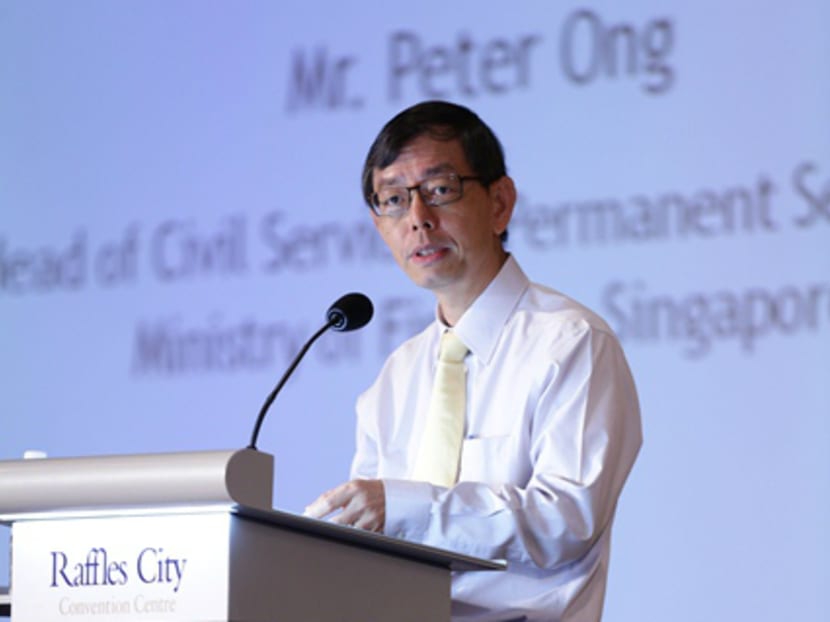Studying behaviour ‘can lead to better results for schemes, policies’
SINGAPORE — The online sphere was identified today (June 25) by Head of Civil Service Peter Ong as an area with great scope for policymakers to understand Singaporeans’ behaviour and apply, in his words, “the right nudges”.

Mr Peter Ong, Head of Civil Service, gives an opening address at the behavioural economics conference organised by the Civil Service College, National University of Singapore and University of Southern California on June 25, 2015. Photo: Civil Service College
SINGAPORE — The online sphere was identified today (June 25) by Head of Civil Service Peter Ong as an area with great scope for policymakers to understand Singaporeans’ behaviour and apply, in his words, “the right nudges”.
“The digital space is an emerging domain where behavioural study is relatively new and carries great potential. There are many nudge effects in the online space,” said Mr Ong, who was speaking at regional behavioural economics conference held at Raffles City Convention Centre.
“For example, the first few comments on a new article may have a disproportionate influence on the tone of the subsequent discussion. Also, how can the silent majority be nudged to speak up in the online space, so that a better balance of views is captured?”
Apart from online space, Mr Ong said that behavioural interventions could also be applied via smart devices to, for example, achieve “constructive social behaviour” or help people to control their daily calorie intake. More complex problems such as promoting and sustaining philanthropy and volunteerism, as well as forming gracious social norms could also be addressed, he suggested.
“These would be the areas that I see great potential for behavioural insights to be applied, and I urge the community to research more in these areas and share results,” Mr Ong said.
Mr Ong noted that in Singapore, elements of behavioural economics and insights have long been present in public policies — “not in an ideological way, but simply aimed at ensuring better outcomes of schemes or policies implemented”, he said.
Citing several examples, he revealed that in a trial which the Ministry of Manpower conducted in collaboration with United Kingdom Behavioural Insights Team, placement rates for jobseekers went up significantly after initiatives such as placing stars on the walls of the consultation room in the job centre to visually represent the number of people who found jobs, and installing a message board for job seekers to express their commitment to the job search.
Almost half of those who benefitted from these measures found jobs within three months, compared to 32 per cent of those who did not receive the interventions.
Other recent examples include the Land Transport Authority’s Travel Smart Rewards scheme, under which commuters are incentivised to take public transport during off peak hours, and the Health Promotion Board’s Million KG Challenge — a weight management programme that rewards participants for taking steps to achieve and maintain a healthier body weight.
Mr Ong noted the importance of conducting trials before the rollout of intervention initiatives. This helps policymakers “detect any unexpected and unintended behavioural response from citizens” and reduces the likelihood of a wrong intervention, he said.
While it is “increasingly important” to understand behaviours and encourage citizens in the right ways, Mr Ong said policymakers must be careful not to overreach. “This is but one tool that policymakers can rely on. It should be a complement to traditional approaches and knowledge, to build on and not replace them,” he said.








